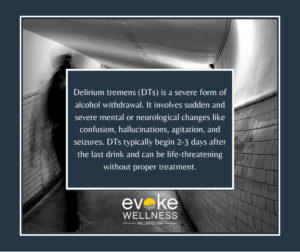You wake up shaking, heart racing. The bed is drenched in sweat. Hallucinations dance at the edge of your vision. Hydrocodone has hijacked your brain chemistry. This delirium tremens is the first sign of physical addiction. Take back control through inpatient rehab at Evoke Wellness.
- Over 2 million Americans addicted to prescription opioids like hydrocodone
- Detox safely under 24/7 medical supervision
- Proven therapies reshape thinking and behavior
- Cognitive behavioral therapy
- Dialectical behavioral therapy
- Acceptance and commitment therapy
- Customize treatment with specialized tracks
- Prescription drug rehab
- Acute detox center
Freedom from addiction starts with one call.
If you or a loved one is considering treatment, Evoke Wellness at Hilliard invites you to contact us. Our compassionate team is ready to answer your questions, discuss your needs, and help you take the first steps toward recovery. In Hilliard, you’ll find more than just a treatment program – you’ll discover a community dedicated to your wellness and success. Together, let’s embrace the journey to recovery and the promise of a new beginning. Call us at (833) 949-1347 today or reach out online.
What Is Delirium Tremens?
Delirium tremens (DTs) is a severe form of alcohol withdrawal involving sudden and severe mental or neurological changes. It typically occurs after heavy, prolonged alcohol use when blood levels drop rapidly.
Key Symptoms
- Severe confusion, disorientation
- Body tremors, shaking, agitation
- Vivid hallucinations (seeing or hearing things)
- Fever, sweating
Who Is at Risk?
You’re at higher risk of experiencing DTs if you have previously had alcohol withdrawal seizures or delirium tremens. Those with other medical issues are also more vulnerable.
Seek Emergency Care
DTs can be life-threatening without proper treatment. Seek emergency medical care if you or someone you know shows signs of delirium tremens during alcohol withdrawal. Inpatient detox and rehabilitation is highly recommended.
Symptoms of Delirium Tremens
Delirium tremens (DTs) is a severe form of alcohol withdrawal that can occur suddenly after stopping prolonged and heavy alcohol use. Its symptoms typically start within 48-72 hours after the last drink.
Hallucinations
- Visual hallucinations like seeing vivid, terrifying images or feeling something crawling on the skin.
- Auditory hallucinations like hearing voices or sounds that aren’t real.
Confusion and Disorientation
- Loss of awareness of surroundings or personal identity.
- Inability to focus or have coherent thoughts.
Cardiovascular Issues
Rapid heart rate (tachycardia).
- High blood pressure (hypertension).
- Excessive sweating.
Tremors and Seizures
- Severe, uncontrollable shaking or trembling of hands and body.
- Risk of tonic-clonic seizures (grand mal seizures).
Seeking immediate medical attention is crucial for delirium tremens, as it can lead to life-threatening complications without proper treatment and care.
Causes and Risk Factors for Delirium Tremens
Heavy, Prolonged Alcohol Use
The primary cause of delirium tremens is sudden cessation of heavy, prolonged alcohol intake after your body has become physically dependent. Years of excessive drinking change brain chemistry, making you reliant on alcohol to function “normally.”
Alcohol Withdrawal Severity
Your risk increases with the severity of alcohol withdrawal symptoms when you quit drinking abruptly. Severe withdrawal raises the likelihood of experiencing hallucinations, confusion, agitation, fever, and tremors characteristic of DTs.
Co-occurring Medical Conditions
Certain medical issues like infections, head injuries, or disorders that affect electrolyte levels can heighten DT risk during alcohol withdrawal. Proper medical supervision is crucial for high-risk cases.
Diagnosis and Treatment of Delirium Tremens
Recognizing the Symptoms
You may experience tremors, hallucinations, agitation, fever, and confusion if suffering from delirium tremens. Seek medical help immediately if these symptoms arise after stopping alcohol consumption.
Inpatient Treatment
Inpatient rehab provides a safe, medically supervised environment to detox and recover. Medications help manage withdrawal, while therapy addresses the psychological aspects of addiction.
Comprehensive Care
- Cognitive behavioral therapy reshapes negative thought patterns
- Dialectical behavior therapy builds coping skills
- Acceptance and commitment therapy promotes mindfulness
- Acute detox center provides around-the-clock monitoring
- Prescription drug rehab tackles dependence on hydrocodone or other medications
With comprehensive inpatient treatment, you can overcome delirium tremens and achieve lasting sobriety.
What Is Hydrocodone Addiction?
A Powerful Opioid
Hydrocodone is a potent opioid medication prescribed for moderate to severe pain relief. As an opioid, it carries a high risk of dependence and addiction when misused.
Signs of Addiction
You may have a hydrocodone addiction if you experience intense cravings, withdrawal symptoms when stopping use, or continuing use despite negative consequences. Other signs include taking higher doses, using for nonmedical reasons, or “doctor shopping” to obtain prescriptions.
Dependence vs Addiction
Dependence refers to physical reliance where stopping causes withdrawal symptoms. Addiction involves compulsive drug use and an inability to control intake despite harm. Both indicate the need for professional treatment.
Signs and Symptoms of Hydrocodone Addiction
Physical Symptoms
- Drowsiness, dizziness, slurred speech
- Constricted pupils, flushed skin
- Slowed breathing rate, constipation
Psychological Signs
- Strong cravings for the drug
- Obsessive thoughts about obtaining hydrocodone
- Mood swings, irritability, anxiety
Behavioral Changes
- Doctor shopping to get more prescriptions
- Social withdrawal, neglecting responsibilities
- Risky behaviors while under the influence
Recognizing these signs can prompt seeking help through detox and comprehensive addiction treatment. Inpatient rehab provides a safe, supportive environment to overcome hydrocodone dependence.
Dangers and Health Risks of Hydrocodone Addiction
Physical Dangers
- Respiratory depression
- Constipation
- Nausea and vomiting
Mental Health Risks
- Depression
- Anxiety disorders
- Increased risk of overdose
Prolonged hydrocodone abuse can have severe, potentially life-threatening consequences. The opioid disrupts normal brain function, leading to dependence and addiction over time. Users may experience withdrawal symptoms like muscle cramps, insomnia, and diarrhea when trying to quit. Seeking professional treatment is crucial for safely overcoming hydrocodone addiction.
Treatment for Hydrocodone Addiction
Overcoming hydrocodone addiction takes professional help and commitment. At our inpatient rehab, you’ll receive specialized, evidence-based care through programs like:
Cognitive Behavioral Therapy (CBT)
- Identify and change negative thought patterns fueling addiction.
- Develop healthier coping mechanisms and life skills.
Dialectical Behavior Therapy (DBT)
- Learn mindfulness and emotional regulation techniques.
- Improve interpersonal effectiveness and distress tolerance.
Acceptance and Commitment Therapy (ACT)
- Foster psychological flexibility and commitment to values.
- Accept difficult thoughts/feelings without judgment.
Our comprehensive approach combines behavioral therapies, medications, and holistic wellness. You’ll have 24/7 support from our dedicated team through every stage – from safe medical detox to aftercare planning.
Inpatient Treatment and Recovery Programs
Intensive inpatient programs provide a safe, structured environment for overcoming hydrocodone addiction and delirium tremens. These programs include:
Acute Detox Center
- Medically supervised detox to manage withdrawal symptoms.
- 24/7 care and support for a successful, comfortable detox.
Cognitive Behavioral Therapy (CBT) Program
- Identify and change negative thought patterns fueling addiction.
- Develop coping strategies to prevent relapse.
Dialectical Behavioral Therapy (DBT) Program
- Learn mindfulness and emotion regulation skills.
- Improve interpersonal relationships and distress tolerance.
Acceptance and Commitment Therapy (ACT)
- Embrace your life’s values instead of avoiding difficult emotions.
- Gain psychological flexibility and commit to positive change.
Prescription Drug Rehab
- Comprehensive treatment tailored to prescription opioid addictions.
- Address psychological, physical and social impacts of abuse.
Delirium Tremens and Hydrocodone Addiction FAQs
What is delirium tremens?

How is hydrocodone addiction treated?
Hydrocodone is a highly addictive opioid medication. Overcoming hydrocodone dependence often requires a comprehensive inpatient treatment program. This allows for:
- Medically supervised detox to manage withdrawal safely
- Therapy like CBT to modify addictive behaviors
- Holistic care addressing co-occurring mental health issues
Why choose inpatient rehab?
Inpatient or residential treatment provides 24/7 support and structure. This allows you to focus completely on your recovery, away from triggers. Benefits include:
- Evidence-based therapies like CBT, DBT, and ACT
- Peer support and community
- Dual diagnosis treatment for co-occurring disorders
- Thorough discharge planning for long-term sobriety
Inpatient care gives you the best chance at a full, lasting recovery from DTs, hydrocodone addiction, or any substance use disorder.
Conclusion
You now understand the serious risks of delirium tremens and hydrocodone addiction. Our inpatient treatment provides 24/7 medical care during detox and recovery in a safe, structured environment. We offer evidence-based therapies like CBT, DBT, and ACT to build coping skills for long-term sobriety. With personalized care, you can overcome addiction. Contact us today to learn more about our prescription drug rehab and acute detox center. Your journey to healing starts here.
Begin Your Journey with Evoke Wellness at Hilliard
If you or a loved one is considering treatment, Evoke Wellness at Hilliard invites you to contact us. Our compassionate team is ready to answer your questions, discuss your needs, and help you take the first steps toward recovery. In Hilliard, you’ll find more than just a treatment program – you’ll discover a community dedicated to your wellness and success. Together, let’s embrace the journey to recovery and the promise of a new beginning. Call us at (833) 949-1347 today or reach out online.



